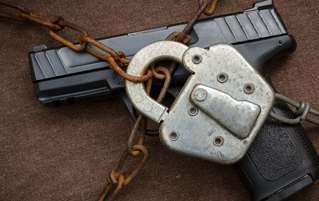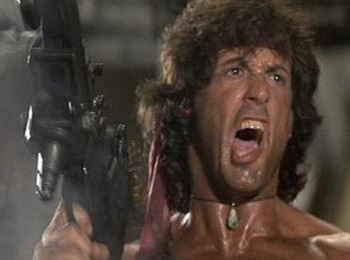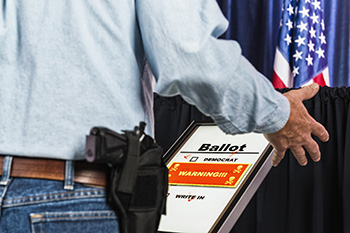5 Reasons Gun Control In The United States Is A Lost Cause

Gun control is a polarizing topic in the United States, and for damn good reason. Every year, tens of thousands of Americans die as a result of injuries caused by firearms. That coupled with the litany of mass shootings that have dominated headlines in recent years makes curbing gun violence a national priority. At the same time, an also sizable portion of the country seemingly fears nothing more than a tyrannical government swooping in and taking all the guns. As a result, the steps we take in the name of curbing gun violence often come off as ceremonial gestures at best. We talk about a few examples on this week's Unpopular Opinion podcast ...
... where I'm joined by comic Jeff May and Cracked art dude Randall Maynard. I'll do the same in this column right damn now. Off we go!
We Worry Most About Guns Criminals Use The Least

No weapon draws the ire of the anti-gun crowd quite like the AR-15. It's been described in recent reports from respected publications like the New York Times, PBS, Washington Post, and Al Jazeera as the weapon of choice for mass murderers in the United States. While it's true the AR-15 has been used in a mass shooting or two, these reports are overstating the problem a bit.
The truth is that, in a lot of ways, the AR-15 is kind of like the pit bull of guns.

Mr. Worldwide!
Despite what the above photo may imply, I'm actually referring to the dog. They've both at various times been characterized as nothing more than killing machines that no clear thinking American would ever want in their home, but just as pit bulls are really just good boys and girls, the AR-15 is ... just another gun. Sure, it looks scarier than most, and it's definitely the weapon of choice if you're looking to kill from a long distance but also on kind of a budget, but beyond that it isn't any more or less dangerous than most other guns.
Contrary to popular belief, it's not an assault rifle. People who use that term are thinking of automatic weapons like the M16. Those guns include a selector switch with an "automatic" setting. When that's engaged, the gun will continuously fire for as long as you hold down the trigger, just like in motherfucking Rambo.

The AR-15 doesn't have this option. You have to pull the trigger each time you fire. It's a semi-automatic weapon, just like countless handguns.
So why is it the preferred weapon of most mass murderers? It's not. Yes, it was used in the mass shootings in San Bernardino and Newtown, but reports that an AR-15 was used in the Orlando shootings turned out to be incorrect. The weapon used in that crime was a Sig Sauer MCX, which kind of looks like an AR-15 but uses a firing system that makes it more comparable to the much deadlier AK-47.
Mother Jones magazine has been tracking mass shootings in the United States since the assault weapons ban was lifted here in 2004. Since that time, they've documented 46 mass shootings, and only 14 involved an AR-15. The deadliest mass shooting in this country prior to Orlando was the 2007 massacre at Virginia Tech, which was pulled off using two handguns. Mass shooters use the guns they have available. Outlawing the AR-15 alone won't impact that in the least.
Sure, you can buy extended clips for the AR-15 that allow you to fire more times before reloading, and savvy murderers can modify it to operate like an automatic weapon, but you can also do all of those things with a handgun, as demonstrated at the 0:34 mark of this mildly terrifying video.

Or in this handy GIF!
Don't get me wrong, I'm not saying the AR-15 is a good thing, but as this Salon.com article put it, banning the AR-15 to stop mass shootings is like "regulating drunk driving by banning Scotch." You'd get damn near the same results doing nothing at all. Speaking of that ...
We Barely Even Mention Suicide

Do you know what accounts for the most gun deaths in this country? It's suicide, and I can assure you almost none of those tragedies involve some despondent soul putting the business end of an assault rifle in their mouth. If we really wanted to cut down on the number of deaths caused by guns in this country every year, we'd spend a little more of our resources on seeing what we can do to stop people from killing themselves with handguns.
That there's a correlation between gun ownership and suicide is the kind of obvious thing people shouldn't even need explained or proven to them. If you are the sources and statistics kind, consider this study that showed people who own guns are three times more likely to take their own lives. Suicide is an impulsive act. If you have a gun on hand at the moment you decide to do it, you're way more likely to follow through (and succeed) than a person who decides they want to do it then has to figure out how.

In 2006, Israel addressed rising suicide rates among soldiers by refusing to let them take their service weapons home with them on weekends. Suicide rates dropped by 40 percent.
If we truly wanted to cut down on the number of people killed by guns each year, fixing our broken mental health system would go along way toward helping us achieve that goal. Instead, we've spent the better part of four decades shutting down psychiatric hospitals and criminalizing mental illness. In fact, that last part even makes some health professionals hesitant to enter into the gun debate, fearing that the public's perceived association between mental illness and violence leads to discrimination that would only get worse if this became a national talking point.
Still, there's no denying that a lack of handguns leads to fewer suicides. When Washington, D.C., banned handguns in 1976 ...

... suicides by gun dropped dramatically, but suicide by other means stayed about the same. Draw your own conclusions. Does that mean we should ban handguns altogether? Even if it did, good luck ever pulling that off. However, a 2011 study did show that background checks and waiting periods led to a significant drop in suicide rates among white males, who happen to be the demographic most likely to take their own life using a gun.
So, with that in mind, background checks seem like the answer, right? They cut down on suicide rates among the demo most likely to use guns for that purpose and, of course, they keep weapons out of the hands of criminals. Except not really. Keep reading.
We Pretend Background Checks Will Fix Everything

There have been more than 500 murders in the city of Chicago this year alone, and you'll note that we haven't even reached the final quarter of the calendar yet. Most of those murders are the result of the other thing that, along with suicide, makes the annual gun death numbers in this country so unspeakably high -- gang violence.
It's a common misconception that the extreme violence plaguing Chicago happens in spite of the city being subject to some of the toughest gun laws in the nation. Their gun laws aren't any more or less strict than most other big cities. It doesn't matter, though, because most of the guns that helped "Chiraq" earn its nickname come from out of state.
It's the same story in other large metropolitan areas. Like New York City, for example, where officials claim 90 percent of the guns found at crime scenes are trafficked in from other places.
There's even a snappy name for the route criminals use to sneak guns into major cities. It's called The Iron Pipeline, but its birth name is Interstate 95. That stretch of road, along with its various connecting highways, is responsible for moving untold numbers of guns from the Southern states and places like Indiana (where Chicago's guns come from) to places where restrictive gun laws put weapons outside the reach of criminals.

We like to think that background checks keep illegal guns off the streets, but in most cases the guns that travel the Iron Pipeline start out as straw purchases, meaning a person who can and does pass a background check buys the guns for a person who probably wouldn't. That person then takes those guns to several different states and sells them at a profit to other people who also most likely wouldn't pass a background check.
In other words, it doesn't matter what kind of laws we enact to make it harder for criminals to buy guns, because criminals don't work within the framework of the law. As long as there's a hole in the market, someone will find a way to fill it. Even if we did somehow legislate our way into stopping the flow of illegal guns into major cities, we'd still have to figure out what to do about the illegal guns that are already there. When it comes to that ...
We Don't Think About Logistics

Fine, so imagine the dream we all dream of comes to pass and we really decide to crack down on guns. Maybe we even go so far as to institute a mandatory buyback program like the Australian government did in 1996 in response to a series of high-profile mass shootings. The "buyback" part makes it all sound fairly innocuous, but don't forget the word "mandatory" preceded it. What we imagine as scores of crocodile hunters happily switching over to knives in exchange for the promise of free concert tickets or some shit was really just a gun confiscation program. You might recognize that as the absolute No. 1 nightmare of every Second Amendment enthusiast in the country. Just the mere suggestion of such a thing would probably set off riots.
Still, let's imagine that we gave it a try anyway. Estimates on the high end claim the program was responsible for taking 1 million guns off the dusty, kangaroo-infested streets of Australia.

You'll wish you had a gun if this maniac decides it wants to box.
Sounds great, but that amounted to only about one-third of the total number of guns in circulation. There are more than 300 million guns in the United States at present. If we enacted the exact same program and it worked exactly as well as it did in Australia, we'd still have somewhere in the neighborhood of 200 million guns to contend with.
Again, that's only if it worked exactly as it did in Australia, and you're fucking dreaming if you think it would. So then what? Do we go door to door and take the guns by force? Fine, where do we start? Seems most logical that we'd start in areas that are most impacted by gun violence. Raise your hand if you're comfortable with the idea of sending the ultra-militarized police forces of this nation into high-crime areas in large numbers to round up all the guns.

What could go wrong?
Now look around. The people with their hands up are probably racists. The rest of us understand a plan like that would look like nothing short of some Nazi shit.
Still, maybe you're fine with that. After all, as mentioned earlier, if we start with the high-crime areas, a lot of the guns we'd be removing from the equation would be of the unregistered variety. Maybe we could just leave it at that and let the rest of the country keep their guns provided they obtained them legally. That's a compromise even the most staunch militia member should be able to live with, right?
We Forget What Country We're In

Wrong. Or at least I imagine that would be wrong, especially if you're of the mind that some nefarious future form of the government really is planning to take away everyone's guns someday. In that case, the last thing you should want is for the feds to snatch up all the illegal guns, because once those are out of the way, the rest of the guns become significantly easier to deal with. That's precisely why NRA types don't even want gun registration to be a requirement. Registered weapons will be way easier for the totalitarian leaders of tomorrow to track down.
Basically, no one at any level of our current gun crisis is going to part with their weapons as freely as Australians did. Gun violence of all sorts was already on the decline in that country when the stricter laws were put in place. Whether the stricter gun laws even had an impact on homicide rates still seems like a question that hasn't quite been answered yet. They don't have the problems with gang violence that we have. They don't have the right to form a militia and take up arms against the government written into their Constitution.

In short, they don't love guns the way we love guns. That above all else is important to keep in mind when pondering why we can't just Australia our gun crisis away. You might as well ask why we can't just settle it with a civil war like we did with slavery.
So what, is it just a lost cause? Are we just going to have to live with guns forever in this country? Yeah, probably, but that doesn't mean things always have to be the way they are now. When it comes to high-crime areas that absorb the majority of the gun violence in this country, instead of dealing with the guns, deal with the reasons the guns are there. Crazy idea, I know, but it's also a strategy that worked pretty damn well for the city of Boston.
Launched in 1996, Operation Ceasefire was a program that identified youths who were most at risk of succumbing to or participating in gun violence and, you know, sent people to go out and talk to them. As it turns out, if you know why a person is carrying a gun, you can sometimes intervene in a way that ensures no one gets shot or goes to jail.
The impact was almost immediate. Before enacting the program, Boston averaged 44 youth homicides each year. Within two years after the program launched, that number dropped to 10. In 1999 and 2000, there was one youth-related gun homicide.
At least some of that drop is because Marky Mark wasn't around to hate-crime Asians anymore.
The program was inexplicably abandoned in 2005, and that same year there were 37 gun murders committed by youths in Boston. That number rose to 52 by 2010.
So that and other programs of the like are one thing we can do to address one part of the problem. Combine that with some sort of meaningful mental health reform that manages to reduce the number of suicides we put on the books each year and we'd already be well on our way to at least stopping the bleeding a little bit. Hell, that mental health business might even stop a mass shooting or two. Maybe we could toss a few mandatory safety features onto the guns we sell going forward to make them safer to keep around the house, thus (ideally) reducing the number of accidental gun deaths each year as well.
Obviously, even if we did all of those things it wouldn't fix the problem completely. That said, any one of those things would make more sense than our current strategy of making guns an all-or-nothing proposition where we either have to ban them entirely or freely carry them around in public without restrictions of any sort.

We're never going to go for either one of those options, so we have to find some kind of middle ground at some point. Shifting our focus away from ridding the country of guns completely and more toward combating the reasons why we point them at each other (and ourselves) so often might be the way to do it.
Adam will be telling jokes in Chicago on 10/6, Iowa City on 10/7, Omaha on 10/8, Kansas City on 10/9, and Denver on 10/10. You can get tickets to any one (or all) of those shows right here. You're also invited to subscribe to his podcast on iTunes and ConnectPal and to follow his Twitter on Twitter.
Get more takes on gun control in 7 Incredibly Biased Arguments Against Gun Control, and then find some common ground after reading 6 Things Gun Lovers And Haters Can Agree On.
Subscribe to our YouTube channel to see how living in America feels like we're living in The Purge in How Gun Control Made Australia Safer Than America, and watch other videos you won't see on the site!
Also follow us on Facebook, and see if your bafflingly incoherent insults or compliments can stand out from the rest.
Every year we're inundated with movies that are based on true stories. We're about to get a Deepwater Horizon movie where Mark Wahlberg will plug an oil spill with his muscles, and a Sully Sullenberger movie where Tom Hanks will land a plane on the Hudson with acting. But we think Hollywood could do better than this. That's why Jack O'Brien, the Cracked staff, and comedians Lindsay Adams, Sunah Bilsted, Eli Olsberg, and Steven Wilber will pitch their ideas of incredible true stories that should be made into movies. Get your tickets for this LIVE podcast here!
